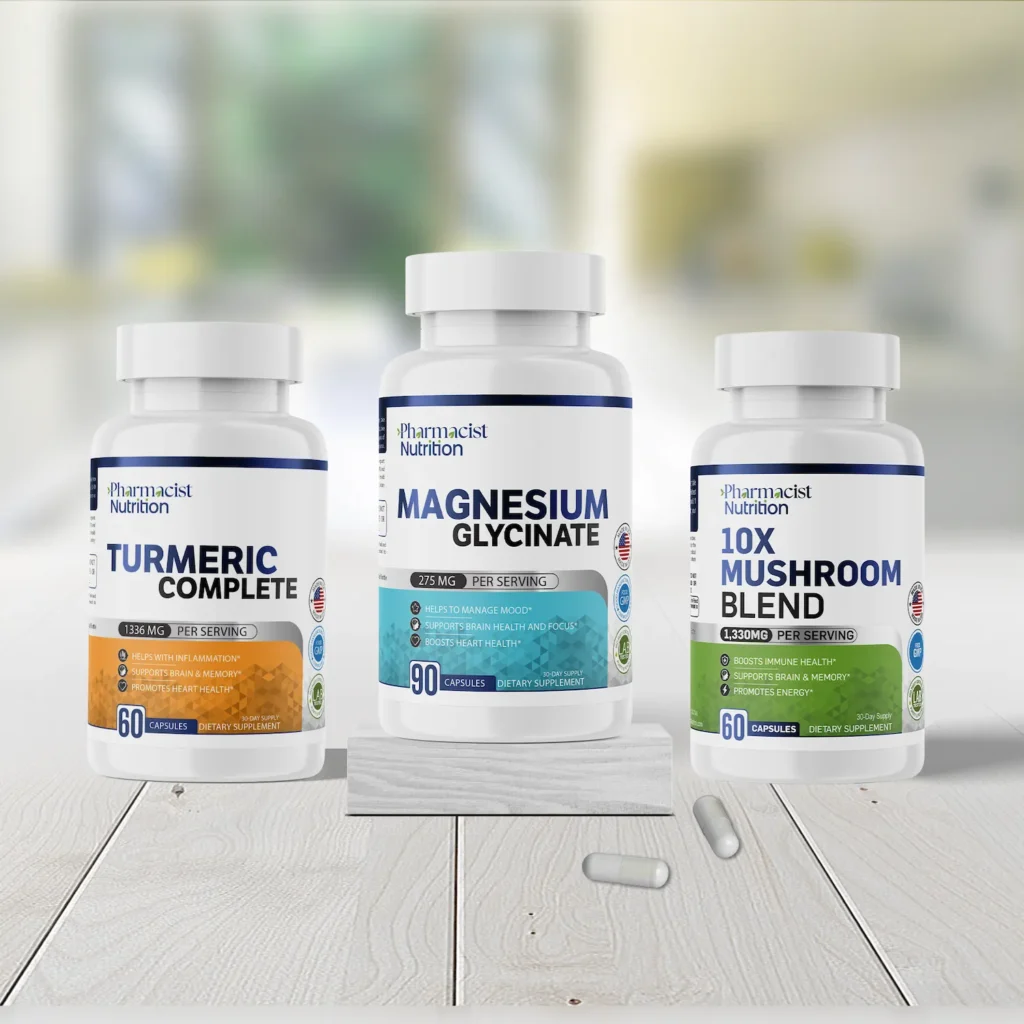
There’s a lot of medicine in the East that here in America, we would kind of scoff at.
Being Asian myself, I did the same thing.
I remember growing up and visiting my relatives and we’d stop by places that have these sort of roots, herbs, and mushrooms and I couldn’t help but think that it was weird.
Later on I went to China and we stopped by a huge herbal medicine store.
While I was there I was being fed on by mosquitoes and my parents bought some cream to help them go away.
And they went away, faster than anything I’ve ever put on them. But even then I convinced myself that it was purely coincidence. LIke they would have gone away on their own without the cream. And to this day I still don’t even know what was in the stuff.
And what we’re going to talk about today is probably the trendiest supplement that comes from Asia right now and that’s Ashwagandha.
It’s so trendy that my technician and I decided to try it for a full month myself and I’ll talk about my personal experiences at the end here.
But as usual let’s talk about exactly what Ashwagandha is.
Ashwagandha is part of a holistic medicine system from India called Ayurvedic Medicine and its origins stem something like 3,000 years.
In Sanskrit, the word “Ayur” means life and “Veda” means science or knowledge so directly translated it roughly means “the science of life” or “knowledge of life.”
That’s pretty cool, especially for 3,000 years ago.
And what is different about Ayurvedic medicine in comparison to our western medicine is that instead of focusing on treating symptoms one by one which is often the case here, Ayurvedic’s beliefs are based on a holistic approach. A balance between mind, body and spirit.
And herbs like Ashwagandha are believed to help in like a complete approach. Supporting the body’s natural healing process, strengthen immunity, and restore overall balance in the body.
And it’s usually a combination approach that involves activities like Yoga and Meditation as well.
So it’s definitely seen as more so of… a way of life rather than the “live like this, and fix me later” attitude we sometimes have here in western cultures.
But, anyway, back to Ashwangdha.
The name Ashwangdha also comes from Sanskrit, and comes from the word “Ashva” which means HORSE and “Gandha” meaning smell. So a direct translation would refer to the strong Horse-Like smell of the plant’s roots.
Now from my personal experience, capsules are the most common way to take Ashwagandha. And the capsules that I have, although there’s a very slight, and I do mean slight odor to it, it’s not strong or bothersome so if you decide to try this, this is not a deal breaker I promise.
The active compounds in Ashwagandha, the stuff that actually works are called withanolides and they’re mostly found in the plant’s roots.
And withanolides are expected to help with a variety of things. As described before, ayurvedic medicine is supposed to help in a holistic way.
The First Thing it’s supposed to do is help with stress, a characteristic that makes it an Adaptogen. If you follow like, health and beauty things on social media you might be familiar with this term and they’re products as described, helps with stress.
And the way they’re thought to do this is through our endocrine system, which is our… glands and organs that produce hormones. And hormones control our bodily functions.
In this instance, we’re most interested in its effect on one hormone in particular, and that’s cortisol which is our body’s primary stress hormone.
I’d like to emphasize that cortisol is necessary for your body because I know the fact that I used the word stress, people are automatically going to think that cortisol is a bad thing.
If it was a bad thing your body probably wouldn’t make it on its own. It prepares the body to challenges and is essential to survival.
The problem is when cortisol levels are elevated too high or too long which turns into chronic stress which is harmful and can lead to someone feeling anxious, depressed or tired.
So what Ashwagandha is supposed to do is reduce cortisol levels and as a result reduce feelings of anxiety and make us calmer.
This is the primary function I believe Ashwagandha works in in relation to stress relief.
But there is another way that some researchers have explored and that’s activity in neurotransmitters, which are chemical signals… your body uses to talk to each other and elicit action.
For example, epinephrine, as you know as adrenaline causes a flight or fight reaction.
In our case, Ashwagandha is believed to increase the amount of GABA which is gamma-aminobutyric acid. And you’ll hear about GABA a lot in reference to anxiety, depression, fear and even sleep.
So by increasing the amount of GABA, theoretically, it should improve relaxation.
The Second Thing it’s believed to help with is boosting energy and stamina, and it’s thought to do this in the mitochondria.
If you don’t know what mitochondria is, it’s the part of your cells that produces ATP, which is the energy that your body uses.
Ashwagandha is suppose to increase your mitochondria’s activity and therefore product more energy resulting also in increased stamina.
How it does this, I didn’t actually find explained very well in any studies.
So my best guess on how this could be achieved is 4 ways:
So in summary, either make more mitochondria, lose less mitochondria, boost mitochondria or longer living mitochondria.
The Third Benefit Ashwagandha is believed to have is immune support.
I hear about immune support a lot in Eastern Medicine or Eastern Nutrition all the time and it’s no surprise that this one is here too.
And what we think about in immune support is improving your body’s ability to fight infection, keeping you healthy and decreasing the chances of you getting sick.
And the way it’s supposed to do this is by enhancing white blood cells like lymphocytes and macrophages which your body uses to help identify foreign, unwanted pathogens and gobbling them up.
The way it’s supposed to do this… we’ve already kind of talked about.
Elevated cortisol levels are associated with a blunted immune system. And the prevention of free radical damage as we talked about before also protects the white blood cells from getting damaged.
Also, aside from the protection of white blood cells.
Inflammation is also part of your body’s immune response.
But too much as you might guess, is bad.
Ashwagandha is believed to reduce the amount of inflammation you experience by inhibiting certain inflammatory chemicals in your body.
And there’s a few that’s cited in the studies that I saw if you’d like to look into it in a more technical aspect. But it’s believed to work on TNF-𝛂, Interleukin-6 and interleukin-1𝛃 which are the common inflammatory cytokines that we see.
It also is believed to work on C-Reactive Protein which is associated with arthritis and heart disease.
It’s also believed to work on NF-𝛋B which is associated with autoimmune disorders and cancer.
And lastly effects on COX-2 which is what medicine like Advil and Aleve work on was also mentioned.
Now, I know I’ve mentioned a lot of great stuff. But like many things you eat, it’s not with the possibility of some consequence.
As I’ve mentioned before, I actually tried a month of Ashwagandha.
And to get consistent effects of the studies I’ve read, I insisted on taking doses similar to those studies which was between 2-3 grams or 2000-3000 mg per day.
So I went on Amazon and doses are much smaller but I did find a product that was reasonable that had a serving size of 2,100mg.
Throughout the month, I felt… muted. Very noticeably.
As a scientist, I tried to contribute these feelings to maybe other factors but it all circled back to Ashwagandha.
So in conclusion from my own personal experience… I believe the cortisol effects are potentially quite real and impactful.
If you ask people around me I think they would describe me as relaxed, laid back, easy-going, which probably indicates my cortisol levels are already intrinsically low.
So by bringing down cortisol levels even lower, my hormone levels just aren’t balanced enough to still feel normal, while attempting to get the other benefits of Ashwagandha, particularly increased energy which is what drew me to the stuff in the first place.
So I think Ashwangdha can be used for a variety of people. But the dosing might need a bit of adjustment depending on your needs. So for me, a dose decrease was definitely in line.
To wrap things up Ashwagandha could be used by everyone I believe but it’s definitely not something I would recommend that everybody needs to take.
It’s not an essential part of your normal bodily functions like minerals and vitamins like Magnesium, or Vitamin B12 which I could recommend to anyone who doesn’t think they have an adequate diet.
But overall I think there could be very impactful health benefits to a lot of people who choose to try it particularly to those who believe they’re frequently stressed, anxious or depressed.
Its effects on the immune system however… it’s very difficult to measure and I probably wouldn’t recommend taking it for that reason primarily.
But Ashwagandha has been getting in the spotlight recently so maybe there will be more data in the future to change my mind.
Because it’s technically a natural organic product I would recommend that you get it from a reliable source.
I’ve helped formulate one with PharmacistNutrition which you can find at PharmacistNutrition.com.
From my own experience I’ve dosed it a lot lower at 650 mg per capsule which is what I would recommend as a starting dose and at most three of those per day.
The product is GMP and NSF Certified so you know it comes from a clean facility. It’s Organic Certified by the Utah Department of Agriculture and Food, the manufacturer is part of the Natural Products Association, the product is third party tested and coming from Utah, it’s Made in the USA, which is what I trust because I’m familiar with the regulations we have here.
Well that’s all I have for you today. I hope you learned a bit of something you didn’t know already. If you’re looking for more information on health topics, definitely follow the podcast. There’s also information on our site PharmacistNutrition.com and make sure to sign up for our Newsletter at the bottom of the page.
Again, thanks for tuning in and I’ll see you on the next one.
Images by FreePik
(As Transcribe From Mini-Med Minutes Podcast) Welcome back everybody to another episode of Mini-Med Minutes and today we’re
(As Transcribe From Mini-Med Minutes Podcast) Welcome back everybody to another episode of Mini-Med Minutes. This
(As Transcribe From Mini-Med Minutes Podcast) Welcome back everybody to another episode of Mini-Med Minutes. I
(As Transcribe From Mini-Med Minutes Podcast) Welcome back everybody to another episode of Mini-Med Minutes.
(As Transcribe From Mini-Med Minutes Podcast) Welcome back to MINI-MED MINUTES The presidential election is on
(As Transcribe From Mini-Med Minutes Podcast) Welcome back to Mini-Med Minutes. And today… we’re going to

Join our community to receive:
Sign up now and take the first step towards a healthier you!